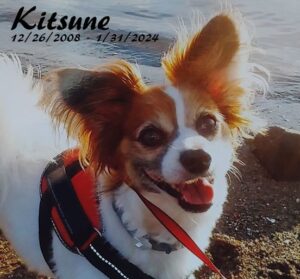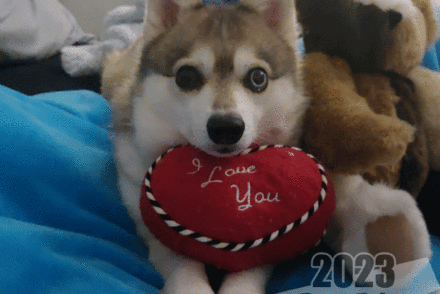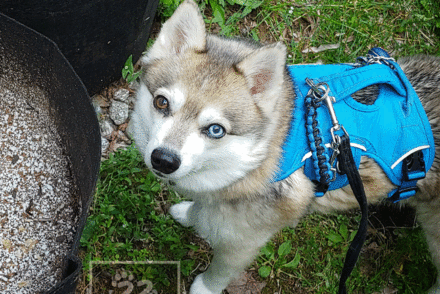I once read a quote about dogs that I don’t feel like trying to find right now. If I do end up finding it I’ll update this later. It was about how dog lovers must sign an invisible contract when they bring a new dog into their lives. You get insane amounts of unconditional love, snuggles, tail wags, laughter, happy days, and fun. But the price you eventually have to pay for all that is steep. I don’t have to type it. We all know what the price we pay is. I know all too well what the price we pay is, because I’ve recently paid it. I’ve been paying it. I think I paid in extra, because I started making deposits before my balance was due. Who do I talk to about a refund? I jest, of course. This post is about anticipatory grief. What is it? And what the heck does it have to do with dogs?

Post Contents:
Anticipatory Grief
Probably somewhat obvious by the name, anticipatory grief, sometimes also referred to as preparatory grief, is a type of grief that is felt before a loss. Anticipating an impending loss can trigger strong emotions such as sadness, fear, anger, isolation, anxiety, or guilt. Anticipatory grief is often associated with an impending death, such as in situations where you are aware that yourself, or a loved one, is nearing the end of life. It can occur in other situations too, however. Some more common examples included feeling anticipatory grief over the impending loss of a relationship, such as a breakup or divorce, or a major life event such as a move or job change. “Regular” grief typically occurs after experiencing a loss. Anticipatory grief is grieving for a loss that has not yet occurred.
Symptoms of Anticipatory Grief
Common symptoms of anticipatory grief can include the following…
- Anger
- Irritability
- Numbness and disbelief
- Guilt
- Sadness
- Anxiety
- Fear
- Mood swings
- Loss of control over emotions
- Desperation
- Dread
- Lack of motivation
- Loneliness
- Isolation
- Depression
- A preoccupation with the terminal loved one
Sounds fun right (/sarcasm)? Although it’s thought that anticipatory grief can actually help some people mentally prepare for an impending loss, it’s not a pleasant experience to go through. The symptoms of anticipatory grief can be bad enough that they negatively impact a person’s everyday life.
Wait, So Is Anticipatory Grief A Good Thing, Or Bad?
Studies on anticipatory grief have been pretty inconclusive. For some people, it does seem to come with some benefits. Anticipating a major loss before it occurs can help some people to prepare for what is to come. It can give them time to come to terms with the loss before it happens, which can sometimes make it easier to do things such as say their goodbyes to loved ones, or make necessary preparations ahead of time. For some people, anticipatory grief can make dealing with a loss easier because they’ve had time to process things ahead of time.
For other people, anticipatory grief can be, at best, just the beginning of their grieving process. It doesn’t always adequately help people to prepare for experiencing a loss. At worst, for others, it can be the beginning stage of prolonged grief disorder. Between 7% and 10% of adults experience prolonged grief disorder, according to the American Psychiatric Association, which can cause intense, persistent, long term symptoms of grief.
How to Cope With Anticipatory Grief
Anticipatory grief can be especially hard. Oftentimes anticipatory grief ends because the normal grieving process has began. Many people will experience at least some symptoms of anticipatory grief up until the event they are preparatorily grieving for occurs.
Talking to understanding loved ones, friends, or even a therapist may help if you are experiencing anticipatory grief. If you are experiencing extreme symptoms, or symptoms that impact your physical health such as sleeplessness or lack of appetite you should talk to your doctor. Practicing mindfulness and self care can sometimes help ease symptoms. Try to maintain a healthy diet and sleep schedule, and exercise regularly if you can. Meditation or other relaxation exercises may help ease stress. Find what works for you! Everyone experiences grief in their own way, and what helps them to get through that grief may differ as well.
What Does Any Of This Have To Do With Dogs?
 This is a dog blog after all. In January of this year (2024) I lost my first dog, my amazing best buddy Kitsune. After 15 years together, as you can probably imagine, dealing with his death has been hard. Kit was a live life loud kind of dog, and pretty much up until the day that he died he was making trouble. Trouble was (literally) his middle name and he 100% lived up to it! He had cancer, but it, unfortunately, took us a long time to figure out he had cancer. Who ever suspects that a dog who is barking at you for second dinner and racing around the house not only has cancer, but has advanced, terminal cancer? I certainly didn’t. Our vet didn’t either.
This is a dog blog after all. In January of this year (2024) I lost my first dog, my amazing best buddy Kitsune. After 15 years together, as you can probably imagine, dealing with his death has been hard. Kit was a live life loud kind of dog, and pretty much up until the day that he died he was making trouble. Trouble was (literally) his middle name and he 100% lived up to it! He had cancer, but it, unfortunately, took us a long time to figure out he had cancer. Who ever suspects that a dog who is barking at you for second dinner and racing around the house not only has cancer, but has advanced, terminal cancer? I certainly didn’t. Our vet didn’t either.
Despite not knowing about Kit’s cancer at the time, I experienced a lot of anticipatory grief especially throughout the last year or so of his life. I knew that Kit was getting old, and we started having to deal with more health issues with him. He was diagnosed with IVDD in 2022 so I worried a lot about him experiencing a flare up of that. He also had arthritis and a heart murmur that we had to stay on top of monitoring.
Let’s face it, health issues aside every senior dog owner knows they have a very sad day ahead of them. It’s the price we pay for all the amazing years of love and companionship our dogs give us. Caring for a beloved aging, senior dog can be a mentally exhausting experience. For me, I for sure had the symptom of “preoccupation with the terminal loved one” when it came to my anticipatory grief over Kitsune. I spent a lot of time worrying about Kit and trying to think of new ways to make his life even better. I’ll never regret doing everything I could to make every moment of his life as happy and as comfortable as possible, but I will admit that the amount of time I was spending worrying about him was causing me a lot of stress. I would cry sometimes thinking about losing him, which then made me feel frustrated. I didn’t want to spend whatever amount of time I did have left with him grieving him prematurely.

Anticipatory Grief Is A Double Edged Sword
Was the anticipatory grief I experienced before losing my senior dog a good thing or a bad thing? I will say that it made me really focus a lot of attention on Kit. Because I was somewhat preoccupied with thinking about his death, I was hyper aware of how important it was to really appreciate the time I had with him. That last year or so of snuggles were extra sweet. I admit that I got quite lax when it came to any form of discipline, because how can you say no to a senior dog? Kit got all the snuggles, and walks, and (almost) all the treats that he wanted. He’d always been spoiled, but especially so in his last years of life. No regrets there.
 I feel like really appreciating the time I spent with Kit, and spoiling him so much, in a small way did help me deal with his death. I knew when he died that we had given him a good life. That I didn’t take him for granted and that, other than not finding out about his cancer sooner, I didn’t have any major regrets when it came to how I cared for Kit, especially in his senior years.
I feel like really appreciating the time I spent with Kit, and spoiling him so much, in a small way did help me deal with his death. I knew when he died that we had given him a good life. That I didn’t take him for granted and that, other than not finding out about his cancer sooner, I didn’t have any major regrets when it came to how I cared for Kit, especially in his senior years.
But, at the same time, the anticipatory grief was hard. It was stressful and sad. In some ways, I feel like it may have been even harder than the actual grief I started dealing with after Kit died. The actual grief has been really hard, don’t get me wrong, but, for me at least, it’s not as anxiety inducing. It’s weird to feel like I’ve been grieving for a dog for so long, when he only died 3ish months ago.
I still have my Alaskan Klee Kai, Fenrir, and I know I’ll more than likely have other dogs in my life in the future. I hope I don’t experience anticipatory grief with Fenrir or any of my future dogs as strongly as I did with Kitsune. I’m confident that I can appreciate them in their senior years, the way I did with Kitsune, without the added stress of prematurely grieving them at the same time. Kit taught me so many important life lessons, one of them, sadly, being about all the hard aspects of living with, and losing, a senior dog. I’m hoping those lessons will make my next loss a bit easier to deal with, but I guess only time will tell. And hopefully it will be a very long time before I lose anyone else close to me!
A Quick Update…
 In my last post I said I was going to try to stick to an every other week posting schedule here. Clearly that hasn’t been working out. I have to admit, that since losing Kit posting here has just been difficult. I’ve had some major writer’s block when it comes to writing about dogs, and writing about Kit still makes me cry. It’s still my plan to post here at least every other week eventually, but for now I’m just going to do what I can. For anyone who wants to hear from us more often, I’ve been more active on our Instagram and Facebook pages than I have here.
In my last post I said I was going to try to stick to an every other week posting schedule here. Clearly that hasn’t been working out. I have to admit, that since losing Kit posting here has just been difficult. I’ve had some major writer’s block when it comes to writing about dogs, and writing about Kit still makes me cry. It’s still my plan to post here at least every other week eventually, but for now I’m just going to do what I can. For anyone who wants to hear from us more often, I’ve been more active on our Instagram and Facebook pages than I have here.
We are doing ok! My partner, Fenrir, and I are all really missing Kit. It just sucks so much not having him around. It feels like a big part of our little family is missing – because it is. I still have bad days, and sometimes bad weeks. But we’re ok. The weather here is finally warming up so we’ve been trying to spend a lot of time taking advantage of that. Nature therapy for the win! Everyday after work I spend time playing outside with Fenrir, and we’ve been fitting in as many spring hikes as we can find time for.
“Healing in grief is a lot like the onset of spring. It’s unreliable and fickle. One day it’s warmish and blue skies and we think, “Hey! We’re feeling better!” Then the next day -or week- it’s sleeting and gray again. But ever so slowly, we advance into better weather. We can’t rush it. We can’t control it. We can’t skip the dismal days. But we can trust that spring and then summer will come.”
– Dr.Alan Wolfelt
Comment Below!
Have you ever experienced anticipatory grief? Did you find any techniques that really helped you to deal with it?

We’ve, unfortunately, been dealing with content scrapers stealing our articles. You shouldn’t be seeing this article on any site other than pawprintpetblog.com! If you’re reading this article on any other site, we’d love for you to take the time to contact us and let us know and, if you have the time, stop by and visit us on our official site! Thanks you.





1 Comment
[…] while others take years. There are many different types of grief, including (but not limited to) anticipatory grief, abbreviated grief, delayed grief, chronic grief, normal grief, complicated grief, inhibited grief, […]